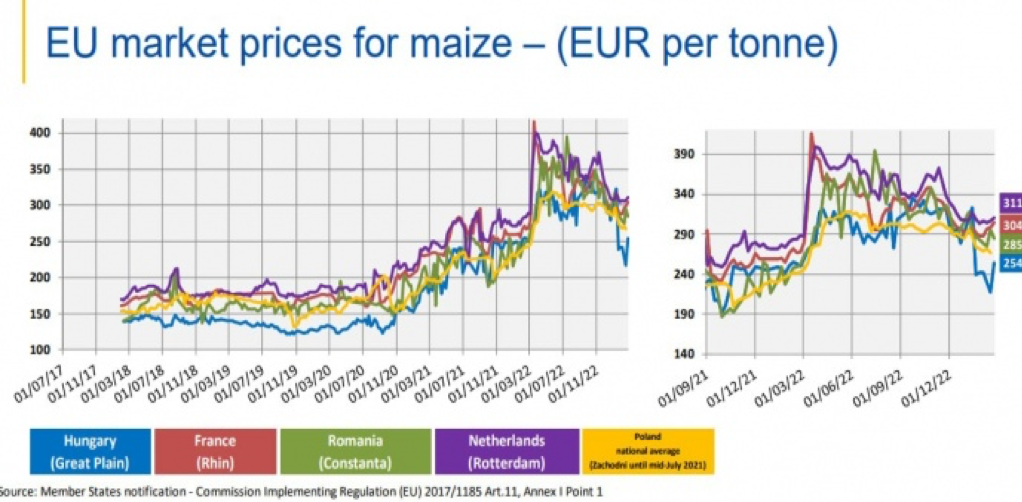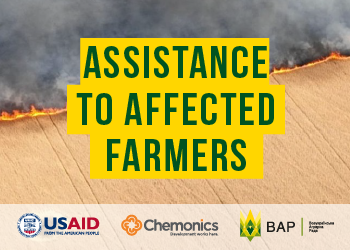
There are more and more statements from representatives of 5 neighboring EU countries that the prohibition on imports of Ukrainian agricultural products will be extended beyond September 15. Let's try to find a way out.
In April of this year, Poland, Romania, Slovakia, Hungary and Bulgaria prohibited the import of Ukrainian wheat, barley, rapeseed and sunflower seeds into their territories. Transit was also restricted. The reason was allegedly a drop in prices for these goods within these countries. After a series of negotiations at the diplomatic level and threats of mirror measures by Ukrainian farmers, transit was resumed, but bureaucratic restrictions were added. The embargo had to be supposed to the end of June 5, 2023, but it was extended until September 15, 2023. In its decision, the European Commission added that the extreme extension would be the last. But the closer we get to the announced date, the more signals the Ukrainian agricultural community receives that the embargo will be extended, but outside the EU's decision, from each of these 5 countries separately.
The price of the embargo - is a loss for everyone
Today, there are two main ways of exporting agricultural products from Ukraine: by sea (ports of Greater Odesa and ports on the Danube) and by land. The last ones go through EU countries to ports and then to third countries. Since the beginning of 2022, Ukraine has exported more than 85 million tons of agricultural products to foreign markets. Sea routes accounted for less than half of this volume - 32.5 million tons. Accordingly, 50 million tons were exported by land through our neighboring EU countries. These are the so-called "Solidarity Routes" that were opened by the EU to help Ukraine export in the face of a full-scale war. In addition, last year, the European Parliament adopted a duty-free regime with Ukraine, which is still active. Against this backdrop, the introduction of the embargo remains unclear.
These restrictions have created unfavorable conditions for trade between Ukraine and the EU. Back in the summer of this year, the National Bank of Ukraine estimated that our country alone was losing up to EUR300 million every month. Processors in these countries also suffered from the export prohibition. They have repeatedly opposed the import ban, as they have lost a large share of raw materials for their products. Transit revenues, which account for the vast majority of Ukrainian agricultural goods, also suffered. By the way, the increase in logistics costs in the western direction is so high that products for Ukrainian agricultural producers are often traded at cost. In this way, traders try to cover the high logistics costs.
There are ways out of the situation, and they have long been voiced
Financing. One way to solve the problem could be to compensate for additional transportation costs. This would make it possible to export grain to European ports that are far away from us and are currently underloaded.
Diplomacy. There are also purely diplomatic levers of influence. For example, we need to raise with the European Commission the issue of ensuring unimpeded transit of Ukrainian exports through the territory of EU members, as it was envisaged by the Solidarity Roads initiative. And remind them that the European Commission did not intend to extend the embargo after September 15.
To wait. There are no economic prerequisites for banning imports of Ukrainian agricultural products. There has been no reduction in the price of products in these countries. This is proved by the calculations of experts from the Kyiv School of Economics. Based on Eurostat data, they showed that the difference between prices in Poland and other EU countries remained the same as before the war.

So, the restrictions are political. By a strange coincidence, elections are scheduled to take place in a number of the announced EU countries this fall. Political forces trying to get additional votes are harming both Ukraine and the EU economy. For example, in Poland, there are already statements that raspberries and honey should be added to the already banned agricultural products. There are high hopes that the situation may change after the elections.
Mirror actions. Even before the embargo was introduced in Poland, groups of protesters began blocking the border with Ukraine. And to restrict transit, additional checks and requirements for Ukrainian agricultural products were introduced. But this game cannot be played alone. The State Service of Ukraine on Food Safety and Consumer Protection can strengthen control over the quality and safety of agri-food products imported to Ukraine from certain EU members. I believe that Ukrainian farmers will not hesitate to go on strike.
International courts. The current situation can be resolved in international courts. In an interview with Politico publication, Taras Kachka, Deputy Minister of Economy and Trade Representative of Ukraine, said that Ukraine may file a lawsuit with the World Trade Organization (WTO) against 5 EU members if they do not lift restrictions on the export of Ukrainian agricultural products after September 15.
All these actions fall under the characterization of a "trade war". But Ukraine did not start it. And judging by the slow reactions of the Ukrainian authorities, we can say that they are not interested. Ukrainian agricultural products do not pose a threat to these countries. This can be seen both in price fluctuations and in the fact that the vast majority of Ukrainian agricultural exports are in transit. It is important to preserve it and do not limit it.
Denys Marchuk, Deputy Chairman of the Ukrainian Agri Council - for the publication "WE-UKRAINE"
Wednesday, 13 September 2023
